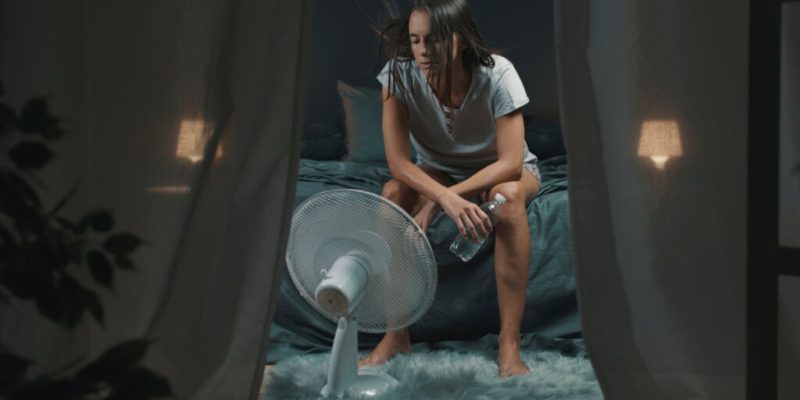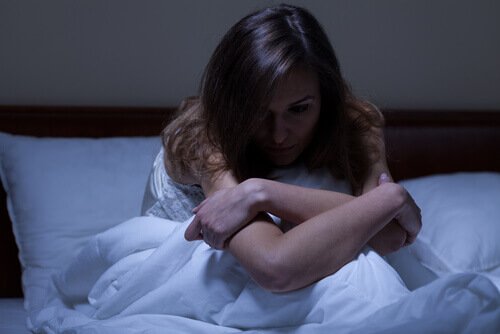After a year of stress, work pressure, and various other obligations, we look forward to the arrival of summer so we can have a rest. However, despite the greater leisure time and relaxation associated with vacations, our bodies don’t seem to want to collaborate and sleeping becomes an impossible task. In fact, insomnia in summer is really common and is due to various causes. Fortunately, there are ways to combat it.
Difficulty falling asleep or staying asleep isn’t a minor issue. Lack of sleep affects our moods, our cognitive functioning, and physical performance. If we sleep poorly, we’re likely to feel tired, listless, and lacking in energy. Furthermore, we feel irritable and moody and have trouble concentrating.
To avoid these unpleasant consequences, it’s important to know what causes insomnia as well as the measures to reduce its impact.
Why does insomnia occur in summer?
Paradoxically, those aspects that you like the most about the summer season are those that can become your worst enemies when it comes to resting. Here are the main ones:
More hours of light
During the summer there are more hours of daylight and the sun sets later. Although this allows us to enjoy more leisure time outdoors, it can also affect melatonin production. This hormone is naturally generated by the body and is responsible for inducing sleep every night.
Normally, melatonin production begins to increase as ambient light decreases, signaling to the body that it’s time to sleep. In the summer, this release is delayed and can cause problems in falling asleep.
High temperatures
This is one of the most obvious causes of insomnia in summer. The ideal environmental temperature for sleep is around 18-21 °C. However, in many homes, it’s almost impossible to maintain.
When the environment exceeds 26 °C, falling asleep and getting quality rest becomes really difficult. In addition, if we choose to open the windows to regulate the temperature, we’re exposed to environmental noise and excessive light that can hinder our rest.
Lack of physical exercise
Physical exercise is an excellent ally in combating insomnia and improving the quality of sleep. However, during the summer our levels of physical activity decrease considerably. We spend most of our time in sedentary activities and this can take its toll on us when it comes to going to sleep.
Different habits and a lack of routine
It’s also common for our routines to become disorganized in the summer. Indeed, during the holidays, we go to bed and get up later than usual and don’t follow fixed schedules. This lack of order can mean we don’t know when it’s time to rest and when we should be active.
Also, naps are frequent during the summer; and, if these exceed a certain amount of time, they can impair our night’s rest.
Leisure and excess
Finally, the summer period usually leads us to certain excesses that harm our rest. We eat larger meals, drink more alcohol, and tend to do so closer to bedtime. It’s even common for us to be more active during the last hours of the day, which makes it difficult for our bodies to prepare for rest.

How to combat insomnia in summer
In short, there are multiple factors that contribute to insomnia being more present during the summer. Even so, there are certain measures you can take to combat it:
- Ventilate and cool your bedroom before sleeping. As far as possible, you must ensure that your environment remains at the optimum temperature. It’s also useful to use fresh bedding, made of fabrics such as cotton or linen.
- Practice physical activity on a regular basis and avoid a sedentary lifestyle. However, it’s important not to do so in the few hours before bed, as this can activate you and prevent you from falling asleep.
- Try to follow a routine and stable schedules. Although it gets dark later, you don’t necessarily have to delay your dinner or bedtime. Even if you’re on vacation, you shouldn’t excessively alter your usual routine.
- Naps shouldn’t exceed 30 minutes in length and shouldn’t be taken later than six pm.
- You should avoid the consumption of alcohol, tobacco, and other stimulating substances in the few hours before bedtime. You should also opt for light dinners and allow yourself time to digest them before going to bed.
- Help your body to recognize when it’s time to rest and when not. To do this, try to be active during the day and spend some time before going to sleep doing quiet activities that lower your level of activation and promote drowsiness.
- Regulate your exposure to light during the last hours of the day to promote melatonin production. Try drawing the curtains and blinds from eight in the evening, maintain dim lighting, and avoid the use of screens.
It’s not always possible to apply the above guidelines; however, try to do so as much as possible. This will help you combat summer insomnia, and give you a better night’s sleep. Then. you’ll be in a better mood and have more energy during the day.
The post Summer Insomnia: Why Does it Happen and What Can You Do About It? appeared first on Exploring your mind.



















Comments